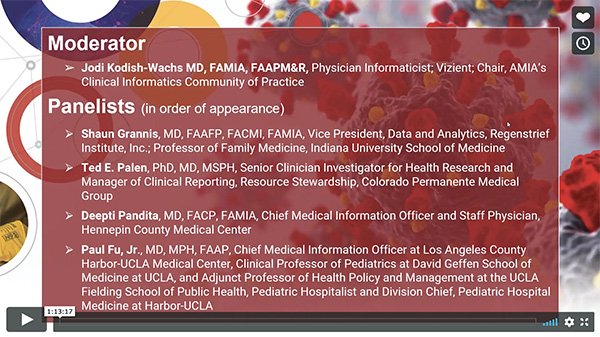Regenstrief VP shares experience tracking coronavirus with health information exchange
Regenstrief Institute Vice President for Data and Analytics Shaun Grannis, M.D., spoke about the importance of healthcare interoperability in tracking disease outbreaks, such as COVID-19, during an American Medical Informatics Association (AMIA) webinar. He detailed how Indiana’s health information exchange (HIE) has been leveraged to give government and health leaders a better situational awareness of the novel coronavirus.
Dr. Grannis, who is also a professor of family medicine at Indiana University School of Medicine, explained how a collaboration among the Indiana State Department of Health, Indiana Family and Social Services Administration, Indiana Management PerformIndiana Health Information Exchange and Indiana University is utilizing data within the Indiana Network for Patient Care (INPC), which is managed by the Indiana Health Information Exchange (IHIE). Indiana has one of the country’s oldest and most robust HIE systems, connecting 100 hospital systems and thousands of physicians, to a central database.
Throughout the state, each test for the novel coronavirus is coded with a standardized LOINC® term, also created at Regenstrief Institute. As positive test results are collected in the INPC, they are counted by using the standard LOINC code and reported to the state department of health.
Dr. Grannis explained how Regenstrief and its data partners are layering predictive modeling on top of the HIE’s syndromic surveillance monitoring to help public health leaders better understand the progression of the virus.
During the webinar, Dr. Grannis spoke about how Indiana’s interoperability enabled the State to begin quickly tracking the virus and greatly improved the State’s understanding of the COVID-19 situation.
“Interoperability isn’t just about standards. It’s about a culture, a group of people willing to work together to solve a problem,” said Dr. Grannis. “Indiana has been doing this for more than two decades. The primary success has not been the technology. It’s been the fabric of trust and collaboration that we’ve been able to build.”
As a result of this interoperability, Regenstrief, IHIE and Indiana University have created an interactive dashboard with statistics related to COVID-19, including demographics, test results and hospitalizations. This information is available to the public here.
About Regenstrief Institute
Founded in 1969 in Indianapolis, the Regenstrief Institute is a local, national and global leader dedicated to a world where better information empowers people to end disease and realize true health. A key research partner to Indiana University, Regenstrief and its researchers are responsible for a growing number of major healthcare innovations and studies. Examples range from the development of global health information technology standards that enable the use and interoperability of electronic health records to improving patient-physician communications, to creating models of care that inform practice and improve the lives of patients around the globe.
Regenstrief Institute is celebrating 50 years of healthcare innovation. Sam Regenstrief, a successful entrepreneur from Connersville, Indiana, founded the institute with the goal of making healthcare more efficient and accessible for everyone. His vision continues to guide the institute’s research mission.
More about Shaun Grannis, M.D., M.S.
In addition to his role as the vice president of data and analytics at Regenstrief Institute, Shaun Grannis, M.D., M.S., is the Regenstrief Chair in Medical Informatics and a professor of family medicine at Indiana University School of Medicine.









